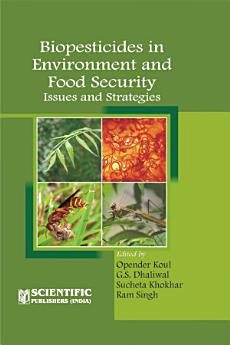Biopesticides in Environment and Food Security: Issues and Strategies
About this ebook
About the author
Opender Koul
Opender Koul, Fellow of the National Academy of Agricultural Sciences and the Indian Academy of Entomology, is an insect toxicologist/physiologist/
G.S. Dhaliwal
G. S. Dhaliwal is currently Visiting Professor, Insect Biopesticide Research Centre, Jalandhar, India. He obtained Ph.D. from the Indian Agricultural Research Institute, New Delhi in 1972 and remained Post-doctoral Fellow at the International Rice Research Institute, Los Banos, Philippines, for two years. A member of the World Food Prize Nominating Academy, he is Fellow of the National Environmental Science Academy (NESA), Society of Plant Protection Sciences, Society of Pesticide Sciences India, Plant Protection Association of India, Indian Society for the Advancement of Insect Science and Entomological Society of India. Honoured with Best Scientist Award of NESA and Lifetime Achievement Award of International Allelopathy Foun-dation, he has been Founder President of the Indian Society for the Advancement of Insect Science and Society of Biopesticide Sciences India, and President of the Indian Ecological Society, He has authored more than 50 book chapters, 250 research papers and review articles, and is author/ editor of more than 40 books on different aspects of pest management, environment and susta-inable agriculture.
S. Khokhar
Sucheta Khokhar is currently Dean, College of Agriculture, and served as Head, Department of Entomology (until June 2010) at CCS Haryana Agricultural University, Hisar, She obtained her Ph.D. from CCS Haryana Agricultural University, Hisar, in 1979 and was a FAO Post-doctoral Training Fellow at Ohio State University, USA in 1999 in the Diagnostic Clinics for Insects and Other Pathogens. A Fellow of the Applied Zoological Research Association (AZRA), CRRI, Cuttack, she is the recipient of Dr. Mrs. Jagadeswari Rao Women Scientist Award 1999 and 2000 bestowed by AZRA. She has established the new identity of 35 insects from Haryana and adjoining areas, and discovered 10 new species of insects. She has published more than 70 research papers in national and international journals of scientific repute and contributed 10 chapters in the books and 3 review papers. She is a co-editor of two books/compendia. She is life member of several scientific societies. She has guided more than 12 post-graduate students and taught taxonomy, morphology, classification and biosystematics courses of Entomology to under-graduate and post-graduate students at CCS Haryana Agricultural University, Hisar and Indian Agricultural Research institute, New Delhi.
Ram Singh
Ram Singh did his Ph.D. from the Indian Agricultural Research Institute, New Delhi, in 1985. He was awarded the European Commission Post-doctoral Fellowship (1991-92) and FAO Post-doctoral Training Fellowship (1998) when he worked on various aspects of insect-plant interact- ions and integrated pest management at the Horticulture Research International, Wellesbourne, United Kingdom. A Fellow of the Royal Entomological Society, London, he is the recipient of University Gold Medal and Aspee Gold Medal, from HAU, Hisar and ICAR award from New Delhi. He has published more than 150 research papers in national and international journals of scientific repute. He has also contributed 17 chapters in the books and 11 review papers. Dr. Singh has co-edited/authored four books and four compendia. He is life member of several scie-ntific societies and also the Fellow of Plant Protection Association of India. He has presented his work at several international conferences in India, Netherlands, Scotland and United Kingdom.




